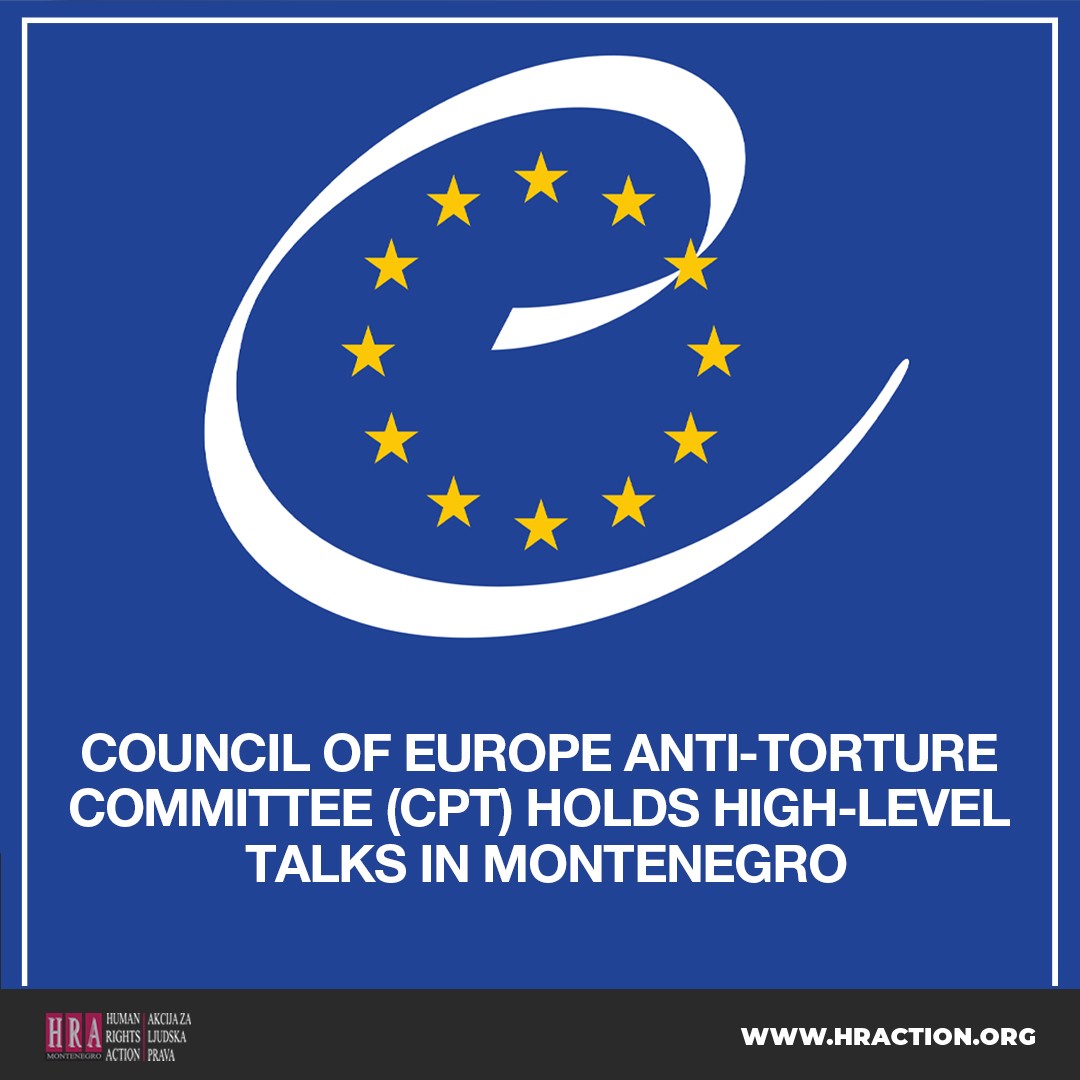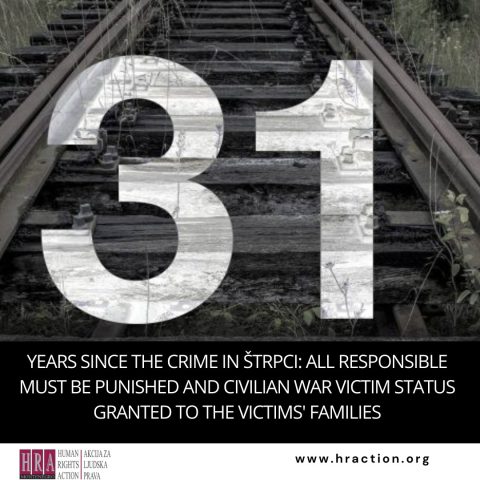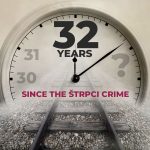
Council of Europe anti-torture Committee (CPT) holds high-level talks in Montenegro
20/02/2024
FROM THE PANEL DISCUSSION “FACING THE PAST – ACHIEVEMENTS AND CHALLENGES” IT WAS STATED: AN UNRESOLVED CRIME REPEATS ITSELF
27/02/202431 YEARS SINCE THE CRIME IN ŠTRPCI: ALL RESPONSIBLE MUST BE PUNISHED AND CIVILIAN WAR VICTIM STATUS GRANTED TO THE VICTIMS’ FAMILIES

Today marks the 31st anniversary of the war crime involving the abduction of passengers from a train at the Štrpci station.
We appeal for the final prosecution of the instigators and all remaining direct perpetrators of the crime, for a thorough search for the remains of the victims, for Montenegro to soon ensure by a fair amendment of the law that the families of the deceased are granted civilian war victim status, and for a lesson on this case to be introduced into history education to prevent people from suffering again solely because of their origin.
In memory of the victims of the Štrpci abduction, their relatives, friends, and other citizens will lay flowers today at 10 AM at the memorials in Pobrežje, Podgorica, and at 1 PM in Bijelo Polje.
The crime was committed by members of the Army of the Republic of Srpska, who stopped a train traveling on the regular Belgrade-Bar line at the Štrpci railway station, on the territory of Bosnia and Herzegovina. They took 20 passengers from the train, of whom 18 were Bosniaks, one was a Croatian, and one remains unidentified to this day. The passengers were then robbed and killed.
The victims were Esad Kapetanović, Ilijaz Ličina, Fehim Bakija, Šećo Softić, Rifat Husović, Halil Zupčević, Senad Đečević, Jusuf Rastoder, Ismet Babačić, Tomo Buzov, Adem Alomerović, Muhedin Hanić, Safet Preljević, Džafer Topuzović, Rasim Ćorić, Fikret Memović, Fevzija Zeković, Nijazim Kajević, Zvjezdan Zuličić, and one unidentified person. The oldest was 59 years old, and the youngest was only 16. Of the twenty, eight were from Montenegro. Only the remains of four victims have been found.
This year, we draw attention to the results of a public opinion survey conducted by DAMAR Agency for the Action for Human Rights, which indicate that the public is insufficiently informed about this event.
Although the majority of respondents (66.1%) had heard of the war crime involving the abduction of passengers from the train in Štrpci, a third had not (33.1%), and most were not accurately informed about the crime.
Only a little over a third of the citizens (38.8%) were accurately informed about this crime. The fact that passengers from Serbia and Montenegro were abducted by members of the Army of the Republic of Srpska, after being singled out as Muslims or Bosniaks to be robbed and killed solely because of their ethnicity, is known to only a quarter of respondents (23.4%), while an approximately accurate response, that the members of the Army of the Republic of Srpska abducted passengers singled out as Muslims or Bosniaks to rob and kill them, was given by 15.4%.
The majority of respondents (61.2%) gave incorrect answers. Among these, most believe that it is not known exactly who abducted and killed the passengers or why (31.6%), that the passengers were abducted on suspicion of fighting on the side of the Federation of Bosnia and Herzegovina’s army (17.8%), or that they were abducted to fight for the Army of the Republic of Srpska (11.8%).
Awareness of the event increases with the age of the respondents. The least informed are those aged 18 to 24 (35.8%), while the best informed are those over 65 years old (88.2%). In terms of education, respondents with higher education are the best informed (68.1%).
In Montenegro in 2002, Nebojša Ranisavljević, a member of the “Avengers” unit of the Višegrad Brigade of the Army of the Republic of Srpska, was convicted for participating in the abduction and wounding one passenger.
In recent years, a total of 14 people have been convicted for participating in this crime, of which 9 have been definitively sentenced. One person entered into a plea agreement.
The commander of the “Avengers,” Milan Lukić, was sentenced to life imprisonment by the Hague Tribunal for participating in other crimes, such as two mass murders of civilians whom he burned alive in houses at two locations in Višegrad. He has not yet been tried for the abduction and murder of the passengers from the train in Štrpci, although he was recently indicted for that crime by the Court of Bosnia and Herzegovina. The instigators of the crime and those who did not prevent this crime, even though they were warned it would happen, have not been charged to this day.
In May 2002, lawyer Velija Murić filed a criminal complaint against 14 people from the top of the then Federal Republic of Yugoslavia, the Republic of Serbia, the Yugoslav Army, and the Railway Transport Company Belgrade. The then Federal State Prosecutor’s Office referred the complaint to the competent Republican Prosecutor’s Office of Montenegro, which has not contacted Murić since.
Family members of the victims of this crime in Montenegro do not have the status of civilian war victims under the Law on Veterans and Disability Protection (“Official Gazette of the Republic of Montenegro,” No. 69/03 and “Official Gazette of Montenegro,” No. 21/08, 73/10, 40/11, 1/15, 52/16), as this protection is only recognized for family members of surviving victims – civilian war invalids, and not for family members of deceased civilian victims, unlike, for example, Bosnia and Herzegovina. The Ministry of Labor and Social Welfare is finalizing work on amendments to the law that would introduce the category of civilian war victims, i.e., family members of civilian war victims, as a special category enjoying the right to social protection.
In May 2022, MPs Suada Zoronjić (URA) and Adnan Striković (SDP) submitted a draft resolution on the Štrpci crime to the Parliament of Montenegro, which, among other things, appeals to the government to provide permanent social care for the victims’ families in Montenegro. However, this proposal has not yet been placed on the agenda.
In the book “Against Oblivion” by the Action for Human Rights, selected testimonies about the abduction of passengers from the train in Štrpci are published. These include the accounts of a man who opposed the abduction of a young fellow passenger, a relative of an abducted passenger who spoke with Milan Lukić, a woman who witnessed the abduction of her husband, and the conductor and stationmaster from the Štrpci station. Finally, the testimony of convicted perpetrator Nebojša Ranisavljević is presented, detailing how the crime was committed.







 English
English